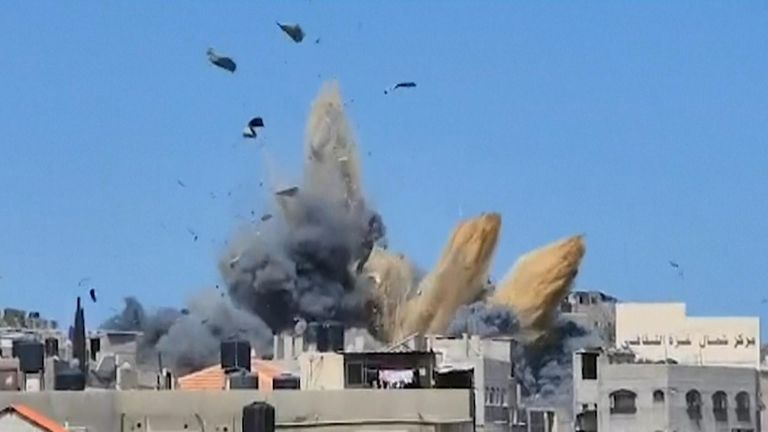World
Israel strikes Syrian military targets near presidential palace in Damascus

Tensions in the Middle East escalated on Wednesday as Israel launched a series of powerful airstrikes on military installations in Damascus, Syria’s capital, with one of the strikes reportedly hitting near the presidential palace.
According to the Israeli military, the operation was a targeted response aimed at halting ongoing attacks on the Druze community in Syria’s southern Sweida region, where unrest has intensified in recent weeks.
Israeli Defence Minister, Israel Katz, confirmed the offensive, saying, “The Israeli military will continue to operate vigorously in Sweida to destroy the forces that attacked the Druze until they withdraw completely.”
READ ALSO: Iran may still recover enriched uranium despite US strikes – Israel warns
The strikes reportedly destroyed a section of the defence ministry building, leaving the area strewn with rubble. According to a Syrian medical source, five members of Syria’s security forces were killed in the strikes.
According to Reuters, an Israeli military official said the assault targeted “the entrance to the military headquarters in Damascus and a military objective near the presidential palace,” accusing Syrian forces of being complicit in the attacks on Druze civilians.
The attacks came despite a recent thaw in relations between Israel and the interim Syrian government led by President Ahmed al-Sharaa.
Sharaa’s administration, composed in part of Islamist elements, had sought improved ties with the United States and Israel.
However, Israel branded Syria’s new rulers as “barely disguised jihadists” and insisted it will block any military movements by Syrian forces into the Druze-majority south.
The United States Secretary of State, Marco Rubio, responded cautiously, calling the situation “complicated,” and added, “It looks like a misunderstanding. I believe progress towards de-escalation will be made within hours.”
Sweida, a predominantly Druze city, has seen a sharp rise in violence this week, as clashes erupt between Druze militias, government security forces, and armed Bedouin tribes.
The Syrian Network for Human Rights reported that 169 people have been killed, while Syrian security sources put the death toll at 300, figures that could not be independently verified by Reuters.
Residents in Sweida described scenes of terror. “We are surrounded and we hear the fighters screaming. We’re so scared,” said one man by phone, adding that families were hiding and trying to keep their children quiet to avoid detection.
A temporary ceasefire was reportedly brokered late Wednesday by Syria’s Interior Ministry and Druze leader Sheikh Yousef Jarbou.
However, another Druze spiritual figure, Sheikh Hikmat al-Hajari, rejected the truce, saying, “Fighting should continue until Sweida is entirely liberated.”
Following calls from within Israel to support the Druze community, scores of Israeli Druze broke through the border fence on Wednesday and joined their Syrian counterparts, a Reuters witness reported.
Prime Minister Benjamin Netanyahu urged restraint, saying, “The Israeli military was working to save the Druze. We call on all Israeli Druze citizens not to cross the border.”
The Israeli military however said it was working to safely return those who crossed.
An Israeli Druze man, Faez Shkeir, expressed helplessness, “My family is in Syria, my wife, my uncles; I don’t like to see them being killed. They kicked them out of their homes, they robbed and burned their houses, but I can’t do anything.”
Reports of looting and extrajudicial killings by Syrian government forces are emerging. A Reuters correspondent in Sweida on Tuesday saw homes being looted and burned.
One resident displayed the body of his brother, shot in the head inside their family home.
In a statement, the Syrian government condemned the lawlessness in Sweida and promised justice.
“Those responsible will be held accountable. The government remains committed to protecting the rights of the people in Sweida.”
President Sharaa, facing mounting pressure from minorities and international observers, has repeatedly promised to protect Syria’s diverse communities. But trust is fading, especially after the massacre of Alawite civilians in March and the failure to contain the current crisis.
U.S. Syria Envoy Tom Barrack, who had previously praised the new Syrian administration and expressed hope for peace between Israel and Syria, condemned the ongoing violence.
“All parties must step back and engage in meaningful dialogue that leads to a lasting ceasefire. Perpetrators need to be held accountable,” he said.

























